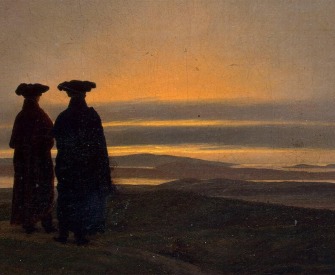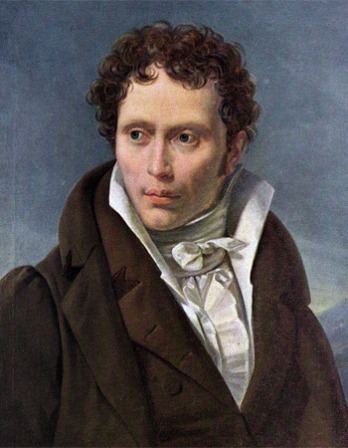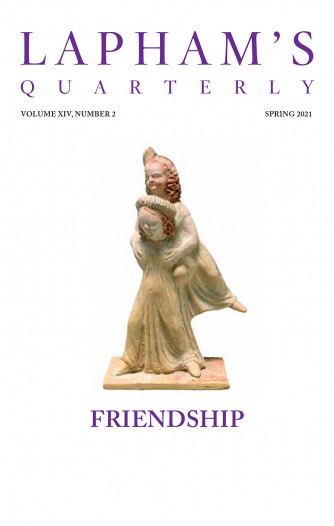Dressed in his saffron mantle, Hymen
went on his way, traversed the boundless heavens
until he came to Thrace, where he’d been summoned
by the voice of Orpheus—to no avail,
for though the god appeared, he did not bring
omens of good fortune for Orpheus and his bride Eurydice;
even the torch he carried merely sputtered,
emitting only tear-producing smoke.
And the aftermath was even more unpleasant,
for as the bride was strolling through the grass,
attended by the naiads, she dropped dead,
bitten on her ankle by a snake.
When Orpheus had mourned sufficiently
in the upper air, he bravely went below
lest he should leave the underworld untried;
he made his way there by the Spartan gates,
and passing through the superficial forms
of those who had been buried up above,
he came to Proserpina and her spouse,
the ruler of this unattractive kingdom,
and master of the shades.
The Thracian bard
plucked at his lyre and began to sing:
“Great god and goddess, appointed to govern in Hades,
into which every living creature relapses,
if it is rightful for me, if I am permitted
to shun all evasions, speaking the truth to you plainly,
know that I have not come down here to your kingdom
just for the view, or to chain up the three-headed Cerberus,
that monstrous child of Medusa, bristling with serpents;
my wife is the cause of my journey: she stepped on an adder
whose venom cut her life short as it spread through her body.
I won’t deny that I wished to—and tried to—endure it,
but Love overcame me. Above, this god is quite famous;
whether he has the same status down here, I’m not certain,
but even so, I would think him to be as well-known,
for unless that tale of long-ago rape was invented,
the selfsame deity joined the pair of you, also!
If that’s the case, then I, by all of these frightening places,
by mighty Chaos and by this realm of the silent, I beg you
to weave once again Eurydice’s fate, done too swiftly.
“We are all owed to you wholly, and though we may linger,
sooner or later all hasten to this single dwelling.
Everyone heads for this place, the home that is final.
Your rule is the longest that any human encounters;
she will be yours by right and dwell down here also,
when her years are accomplished: I ask for her life as a favor,
but if the Fates should deny me the gift I am seeking
on behalf of my wife, be sure that I will remain here,
and you may take pleasure then in a double destruction.”
These words, accompanied on the plucked strings,
so moved the bloodless spirits that they wept.
Then, for the first time ever, overcome
by the effects of song, the Furies wept,
nor could Proserpina reject his prayer,
nor he who rules the underworld deny him;
Eurydice was called up from her place
among the newly dead, and awkwardly
came forward, limping from her recent wound.
The Thracian bard accepted her, together
with the condition set for her release:
that he may not look back at all, until
he’d exited the valley of Avernus,
on pain of revocation of this gift.
He started out upon the soundless path
that rises steeply through dense fog and darkness
until they had come almost to the border
of the upper earth; here, Orpheus, afraid
that she would fail him, and desiring
a glimpse of his beloved, turned to look:
at once she slipped back to the underworld,
and he, because he wanted to embrace her,
or be embraced by her, stretched out his arms—
but seized on nothing, that unlucky man,
unless it was the abnegating air.
And she now, who must die a second death,
did not find fault with him, for what indeed
could he be faulted for, but his constancy?
“Farewell,” she cried out to him one last time,
and he had scarcely heard her cry before
she took her place again among the dead.
From Metamorphoses. Ovid announces his poem’s purpose in its opening lines: “My mind leads me to speak now of forms changed/into new bodies.” He tells some 250 stories of transformation, among them those of Narcissus and Icarus. Ovid attributed his banishment from Rome by Augustus to “a poem and a mistake”—the former his Art of Love, the latter perhaps his having known about the indiscretions of the emperor’s granddaughter. The poet’s books were ordered to be removed from the city’s libraries. Ovid died in exile near the shores of the Black Sea in 17.
Back to Issue





